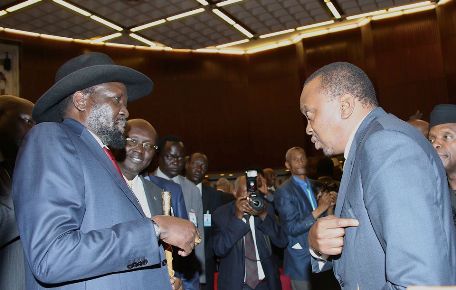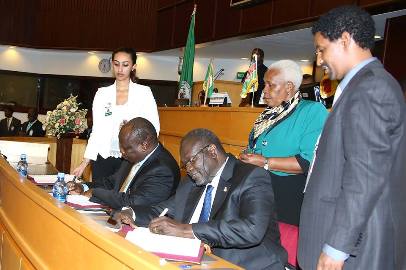South Sudan’s Kiir demands more time, as Machar signs final peace agreement
August 17, 2015 (ADDIS ABABA) – South Sudanese rebel leader, Riek Machar signed the long-awaited final peace agreement to end the 20-month long civil war in the youngest world’s nation on Monday. but president Salva Kiir declined to sign the deal, requesting for more time to consult with his political and military officials back in the capital, Juba.

At the same event, the recently reinstated secretary-general of the ruling Sudan Peoples’ Liberation Movement (SPLM), Pagan Amum, signed the peace agreement on behalf of the former detainees, despite reservations from ruling party chairman on the same deal.
As former vice-president, Machar and Amum signed the deal, the South Sudanese leader witnessed the signing ceremony and initialled his signature on the agreement as a witness.
The president, however, asked the IGAD-Plus mediation to allow him to make further consultations with his officials for 15 days. IGAD leaders reportedly took a lot of time trying to convince him to sign the agreement.
It is not yet clear whether president Kiir was permitted to go for the requested consultation and for how long in order to come back and sign the long-awaited peace agreement.
Machar’s spokesperson, James Gatdet Dak, who confirmed the signing of the agreement by the armed opposition leader and urged the government to show commitment to end the war by signing the peace agreement.

Chief mediator in the IGAD-led South Sudan peace talks, Seyoum Mesfin, said the government has certain reservations and have requested more time for consultations back in Juba.
“In the next 15 days, the government will come back to Addis Ababa to finalise the peace agreement” he said.
Mesfin said the government’s request has also been accepted by the South Sudan rebels.
The agreement signed on Monday, 17 August, which originated from the 24 July Compromise Peace Proposal by the East African regional bloc, the Intergovernmental Authority on Development (IGAD) and its international mediation partners, saw some changes in the course of negotiations in Addis Ababa between the two rival leaders, president Kiir and opposition leader Machar before the signing ceremony by the two leaders minus Kiir.
On power sharing deal, president Kiir’s government will no longer control 100% of seven of the ten states as the armed opposition faction of the Sudan Peoples’ Liberation Movement (SPLM-IO) under the leadership of Machar will now get 15% of seats in each of the seven states of Warrap, Lakes, Western Bahr el Ghazal, Northern Bahr el Ghazal, Central, Western and Eastern Equatoria states.
Likewise, Machar’s faction will no longer control 53% of the governments of the three states of Jonglei, Upper Nile and Unity states. In the three states, government will get 46%, SPLM-IO 40% and former detainees and political parties, 7% each. While SPLM-IO will nominate governors for the two oil-rich states of Unity and Upper Nile, government will nominate governorship position for Jonglei state.
At the national level, the power sharing ratio remained as the original proposal of 53% for government, 33% for SPLM-IO and 14% split equally between former detainees and political parties.
The current 325 membership of the national parliament in Juba will be maintained with rebelled members reinstated to their previous parliamentary memberships before 15 December 2013. SPLM-IO will appoint 50 additional members to the national parliament while the former detainees will appoint one additional member and political parties will appoint 17 additional parliamentarians.
On security arrangements, the partially signed peace deal will declare the national capital, Juba, a demilitarized zone, with a radius of 25kms. Foreign troops, particularly from the IGAD countries and the United Nations Mission in South Sudan (UNMISS) will take charge of the capital for 30 months of the period of the transition until elections are conducted.
The two rival armies will also maintain separate commands for a period of transition with president Kiir being the commander-in-chief of the South Sudan army (SPLA) and rebel leader Machar also as the commander-in-chief of his forces until unification process is completed per the agreement.
IGAD-Plus officials said the peace deal signed by the two leaders was final and that president Kiir would only be expected to sign it without further renegotiations to the deal.
Earlier in the day, Ugandan president Yoweri Museveni walked out of the venue and returned to Kampala before the agreement document was finalized. He was reportedly disappointed when the revised version of the IGAD proposal in Kampala was not considered by the IGAD-Plus. He was not present at the venue when the rebel leader signed the document.
The regional and international leaders have warned to take tough measures against any warring party that will refuse to sign the peace agreement. It remains unclear how the situation will play out between Juba and the international community in ending the war.
Tens of thousands have been killed, millions more displaced internally and to the neighbouring countries of Sudan, Ethiopia, Kenya and Uganda.
IGAD-Plus, which includes five African countries, troika nations, European Union, China and the United Nations, said 17 August was the deadline on which the parties must sign a peace deal and end the deadly violence.
(ST)
